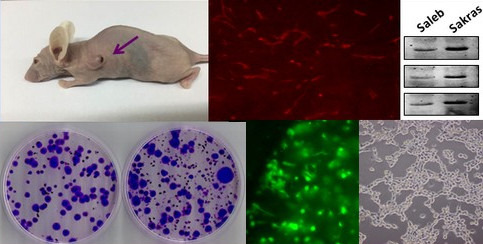
|
||
|
||
 |
Daniela Sanchez Basseres Este endereço de email está sendo protegido de spambots. Você precisa do JavaScript ativado para vê-lo. http://lattes.cnpq.br/8538523405843651 |
|
|
||
 |
Sandro Mascena Gomes Filho Este endereço de email está sendo protegido de spambots. Você precisa do JavaScript ativado para vê-lo. Identification of oncogenic KRAS targets with therapeutic potential in pancreatic cancer. Our objective is to identify new targets of oncogenic KRAS with therapeutic potential and also to understand molecular mechanisms that contribute to the malignant phenotype triggered by activation of this oncogene. The targets we are currently investigating are microRNAs, as well as mitotic Aurora A kinase and its activator TPX2. |
|
 |
Luiza Coimbra Scalabrini Este endereço de email está sendo protegido de spambots. Você precisa do JavaScript ativado para vê-lo. Exploring Aurora kinase A as a therapeutic target for KRAS-induced tumor-initiating cells. The goal of my project is to investigate Aurora A kinase (AURKA) as a therapeutic target for KRAS-induced lung and pancreatic tumor-initiating cells/cancer stem cells (CITs). CITs are defined as self-renewing tumor cells able to initiate tumor formation, sustain tumor growth and drive tumor dissemination, therefore inhibition of AURKA may result in new and more effective therapies with a lower risk of relapse. |
|
 |
Thalita Bueno Corrêa Este endereço de email está sendo protegido de spambots. Você precisa do JavaScript ativado para vê-lo. Identification of long non coding RNAs regulated by oncogenic KRAS in pancreatic cancer. The goal of this project is to identify, in pancreatic cells, long non coding RNAs regulated by oncogenic KRAS, which are important for development and/or maintenance of the malignant phenotype in pancreatic cancer. |
|
 |
Lutero Augusto Hasenkamp Este endereço de email está sendo protegido de spambots. Você precisa do JavaScript ativado para vê-lo. Investigation of IKKβ as a potential therapeutic target for pancreatic tumor initiating cells. Our main goal is to determine how IKKβ affects stemness and metastatic phenotype of pancreatic tumor-initiating cells/cancer stem cells (TICs) obtained from patient-derived xenograft (PDX) tumors, thereby aiming at validating this kinase as a therapeutic target. |
|
|
||
 |
Vanessa Silva Miranda Este endereço de email está sendo protegido de spambots. Você precisa do JavaScript ativado para vê-lo. Exploring IKKβ as an anti-metastatic therapeutic target in KRAS-induced lung cancer. The goal of my project is to investigate the role of the IKKβ kinase in invasiveness and metastasis of KRAS-positive lung cancer cells, thereby providing a scientific basis for the development of new targeted therapies for lung cancer. |
|
 |
Felipe Silva Rodrigues Este endereço de email está sendo protegido de spambots. Você precisa do JavaScript ativado para vê-lo. Exploring IKKβ kinase as a therapeutic target for lung tumor-initiating cells induced by the KRAS oncogene In my project I am investigating the molecular pathways of malignant transformation induced by the KRAS oncogene in the pulmonary epithelium. More specifically, I am focused on studying the role of the IKKb kinase in the biology of KRAS-driven lung tumor-initiating cells/cancer stem cells. |
|
|
||
 |
Vitor Heidrich Este endereço de email está sendo protegido de spambots. Você precisa do JavaScript ativado para vê-lo. Identification of long noncoding RNAs regulated by KRAS in pancreatic cancer. Long noncoding RNAs (lncRNAs) may act as important mediators of the onset and evolution of cancer. Since lncRNAs involved in malignant transformation induced by KRAS - which occurs at high frequency in pancreatic tumors - are not known, we aim to identify long non coding RNAs regulated by KRAS oncogene in pancreatic cancer. |
|
 |
Amanda Salve
Cancer initiating cells (CICs), also known as cancer stem cells, comprise a subpopulation of aggressive tumor cells which are responsible for tumor maintenance and drive tumor dissemination. The goal of my project is to identify markers that allow effective purification of lung CICs with the purpose of exploring therapeutic targets to inhibit KRAS-mutant lung CIC function. |
|



